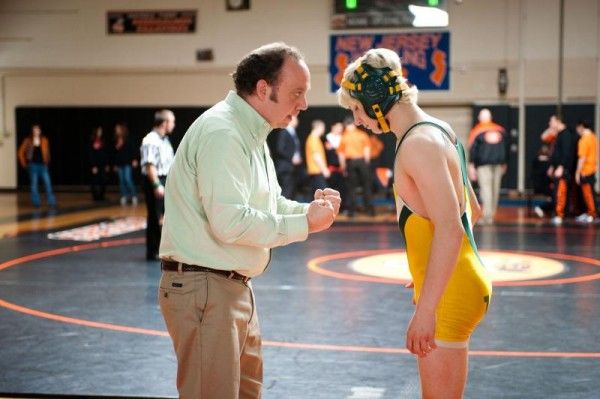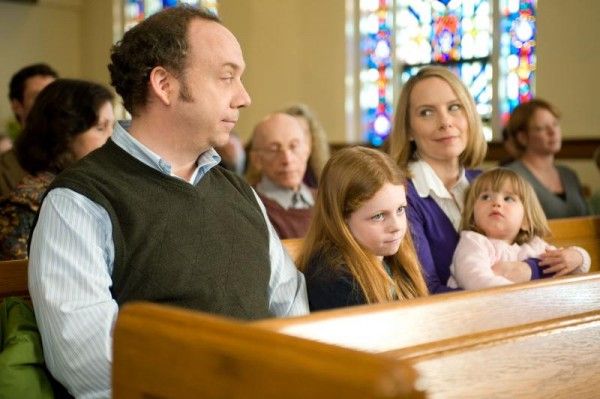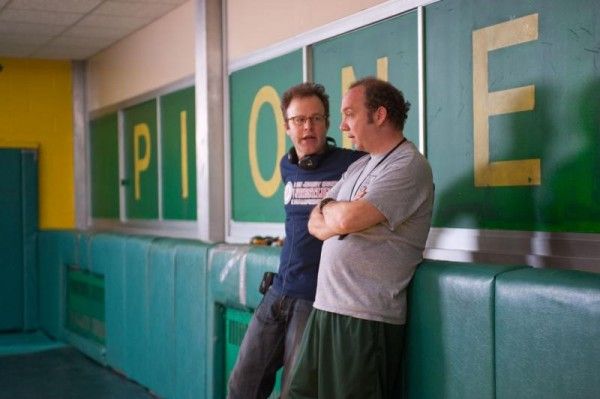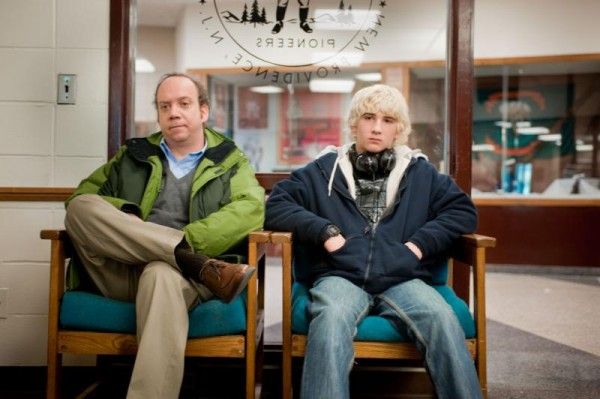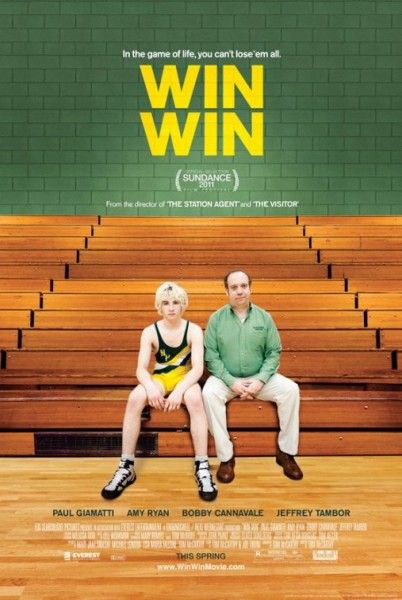Fresh off a triumphant debut at the Sundance Film Festival, Win Win kicks off a national rollout in New York and Los Angeles today. Collider sat down with its star, Paul Giamatti for a fun back-and-forth on the film, along with some surprising revelations. Hit the jump for the audio and transcript, along with his vision for the long-gestating Philip K. Dick biopic, tales of the undeniable sway his American Splendor counterpart Harvey Pekar had with women, and a Spider-Man villain Giamatti’s eyed since childhood.
Win Win follows Mike Flaherty (Giamatti), a lawyer and volunteer High School wrestling coach, who’s grappling with his own issues. When he takes over custody of an elderly client and puts him in a rest home in a shady move for some extra money, Flaherty ends up taking in the man’s grandson, a gifted wrestler, who shows up, unexpectedly and pays big dividends in unexpected ways. The latest film from writer/director Tom McCarthy (The Station Agent & The Visitor) was a big fan favorite at Sundance. No wonder. McCarthy’s script is alternately funny and touching with an uncommon subtlety. Giamatti leads a stellar cast that boasts Amy Ryan, Jeffrey Tambor, Bobby Cannavale and newcomer Alex Shaffer.
Although Giamatti has received stellar reviews and is fresh off a Golden Globe win for Barney’s Version, the Yale alum is not solely focused on acting. Having appeared in the 2003 adaptation of Philip K. Dick’s “Payback,” he’s also been looking to produce and star in a biopic about the famous author.
However, since the interview took place just two days after the Oscars telecast, it seemed fitting to start with his remarkable time at the 2004 ceremony. American Splendor was nominated for Best Adapted Screenplay and he witnessed the red carpet and ceremony with the man he played on screen, legendary curmudgeon Harvey Pekar.
We recommend you click here to listen to the interview, but you can also read on for the transcript.
The Oscars just passed.
PAUL GIAMATTI: Mmhmm.
And you had that experience at the Oscars with (the real-life subject of American Splendor) Harvey (Pekar) on the carpet.
GIAMATTI: (Breathlessly) Yeah!
What are your memories of that time?
GIAMATTI: Oh, that was hilarious. There couldn’t be a more unique experience than doing that stuff with him because he, you know, if you need any dose of like, harsh gritty reality of, like, something to undercut all that stuff, you couldn’t have anybody better than him. But, you know, he was also unbelievably psyched about it, which he would never let you see. Ah, he was classic, but it was surreal. Just seeing him in that kind of environment. was just weird. But, on the other hand, the amazing about him is that he could get along with anybody. He wasn’t really a misanthrope. He was pessimistic, but he actually really liked people. One of the (most fun) things I did with him was going to the Edinburgh Film Festival and it was just me and him. People, women in particular, beautiful woman, in particular, LOVED him ‘cause he just could be so f---ing charming, that guy, if he wanted to be. Because he just was who he was. He was genuinely interested in people. So, he was an amazing guy.
Is there any chance that you’ll be working with (Harvey’s widow) Joyce again on any of his other work that she may be (adapting)?
GIAMATTI: Oh, I don’t know. I don’t know. Maybe. I don’t know. I never talked to her about it, though.
Yeah. Speaking of playing another real-life writer, what is happening with Philip K. Dick, with that film, The Owl In Daylight. Is that still going forward? I know it was through your production company.
GIAMATTI: Yeah. We were talking to his family, actually, about this for a long time. I mean, it’s been a-
His daughters, not (widow) Tessa, right?
GIAMATTI: Isa, one of his daughters, we were talking to about it. I, I don’t know. You know, it’s a tough thing. They never did a script based on that story which was the last unpublished thing of his that still hasn’t ever been public-. Well, he never wrote it. It only exists in the form of him telling somebody on tape, the plot to it. So, we were gonna use that actually ‘cause he got more and more into that thing of using himself as a character. So that seemed, actually, like a good launching pad for some kind of biopic about him ‘cause a straight biopic about him would be sort of pointless. So, it was always a tough thing to get the script right and that didn’t happen for a while. So, it’s gone in and out and I think they’ve gone back and forth about being willing to do it or not and, you know, it’s, he’s a tricky figure and, you know, for them I think it’s… There’s days when I think they’re very enthusiastic about it and then there’s days when they’re like, “You know what? Maybe we should just…”
It’s too tough to tell.
GIAMATTI: It’s a tough story, you know? He had a tough life and you know, he was a tough personality; tricky guy.
[Ed note: The trouble Giamatti talks about started early for Philip K. Dick. His twin sister died in infancy and his parents divorced when he was five. Dick said he was diagnosed, as a teenager, with schizophrenia though later examinations contradicted those findings and he suffered from bouts of extreme vertigo and later, what he described as “nervous breakdowns.” Dick dropped out of college and was married four times before trading vows a fifth and final time in 1973. He died in 1982 due to a combination of strokes and heart failure.]
So, would you escape into his imagination?
GIAMATTI: Well, that’s what I kept saying was, you know, the idea is almost more to make a biopic about his mind, or something. You know, and it’s like, so yeah, there were lots of interesting ideas that got thrown around, but always with him as a character in a story that’s more fictionalized, OR, take, like, a very specific period of his life. Like, the whole thing at the end of his life where he had these kinds of, you know, I guess, sort of, schizoid visions about, you know, that we were actually living in ancient Rome still and stuff like that. You know, to either really narrow it down or do something that kind of opened it up and made it, sort of, fictional, in some way. You know? ‘Cause, it just doesn’t seem, like, to have a whole lot of point to just make a biopic about him. He’s too interesting? (Laughs) You know what I mean? It’s like, his mind is too interesting. His life was sad. I don’t know that it would be all that (pauses then laughs) It would just be kind of depressing.
But it would lend itself to flights of fancy within-
GIAMATTI: It could! Exactly! You could take something of him. I mean, that (The) Owl In Daylight book is very (complicated), but it’s got, kind of, two parallel stories of a guy who is, delusionally, maybe thinks he’s been, kind of, possessed by aliens and it’s these two- then you have it kind of flip to this other side which is sort of the aliens that can make contact with some person. And, they’re very separate stories, but they begin to dovetail in a really interesting way. So, I thought, well, maybe that’s a good starting point.
Yeah. Win Win. It’s about so many things and one of them is trying to keep up. I mean, even that opening sequence, you’re running.
GIAMATTI: Right. Right.
You see the two people pass and then you get exasperated-
GIAMATTI: Right. Yeah.
-and stop. What do you think it says in a larger sense about where we are right now? You know, you can look at him as a metaphor, as a symbol for several things; whether it’s our economy, whether it’s our middle class.
GIAMATTI: Yeah. Yeah!
What do you think the film says?
GIAMATTI: No, I mean, the stuff (Win Win director) Tom (McCarthy) was saying (at the earlier press conference) about the title (of the film) and I was thinking, you know, the title isn’t so ironic as much as it seems ambiguous. You know, I mean, what exactly does it mean to win in this movie ‘cause he doesn’t really win anything. He doesn’t even literally win any of the wrestling matches. So, I mean, it, it’s true. I think there’s definitely the idea of somebody suffering under this economic crunch and the thing that I think is interesting about it that I always thought was sort of, and even when you say that in the beginning, there’s a lot of a kind of a sense of masculinity in this movie, too. Bobby says to me, “You know, my buddy just made a killing with…,” you know, and there’s all this sort of sense that, even the sports stuff, there’s this sense that, you gotta be kind of a killer. You really want to get s--t done, you gotta be aggressive and this guy really isn’t that. And I think part of the interesting thing in the movie is that he comes to accept and hopefully in some way you can see it, that it’s ok not to be that. You know? That it’s all right not to be the killer, aggressive guy. That there’s different forms of winning. You know, and so, he has some kind of redemption and learns something in the end and wins some kind of greater knowledge of some sort but he doesn’t literally get all this stuff he wanted ‘cause he doesn’t have that sharky thing in him. But that’s ok to not have that.
But it’s his own sort of growth. I mean, there’s so, such stunted growth in this film.
GIAMATTI: Yeah.
From the tree (in their frontyard which has been broken off at the top and has to be cut down by Giamatti’s character) that gets broken off .
GIAMATTI: Yeah.
And it’s almost like an acceptance-
GIAMATTI: Yeah!
-you know, of himself and a contentment
GIAMATTI: Yes!
-and, and also learning how to be a parent, too.
GIAMATTI: Yeah, no, and it’s also interesting. He gains a son, kind of, in the movie. Sort of.
He totally does.
GIAMATTI: He does. He totally does. Exactly. Well, that’s funny how that’s never, like, kind of, hammered on any way, in a nice way.
Which I think is the actual, beauty of the film is that it doesn’t.
GIAMATTI: Nothing’s really hammered. No. And so, right, (smiling) it’s never this sort of “Oh, my boy. I finally got a boy” ‘cause he’s in a house full of women. You know, so it’s, there’s a lot of interesting stuff about males, but yeah, that kid (played by Alex Shaffer) is potentially stunted, but he’s also growing and, helps, no that’s a really good, I had never even thought about that with the tree actually as a kind of good sy-, but again, they don’t really ham- (Tom) doesn’t hammer it in any way. I never even thought of that.
Um, you’ve played a number of villains. You’ve got King John in Ironclad coming up; Pig Vomit in Private Parts, everybody knows.
GIAMATTI: Uh huh.
Have you ever been approached about playing a villain in a superhero film?
GIAMATTI: I don’t think so. I’m trying to think, there was something once. One of those Spider-Man movies, I think, they talked about me for something. I don’t remember which one. But, I think, not recently, or anything.
Is it something that you would like to do?
GIAMATTI: I would love to do something like that. Totally. Oh my God!
What’s your favorite comic book franchise that you would love to play, or your favorite villain that you would love to play?
GIAMATTI: Oh, Jeez, I don’t know about that. I’m sort of out of it, on a lot of it.
No, but what’s one, that you would go, I would love to play that one.
GIAMATTI: Oh, it would have been really cool to have done something like… See when I was a kid, like, Dr. Doom was a great character (in Fantastic Four) and those kinds of guys. The Red Skull was a great character in Captain America (played by Hugo Weaving in this summer’s film adaptation). And then Spider-Man had a bunch of great ones. (Laughs) There was a character called the Rhino? Do you remember The Rhino? (Laughing fondly) Do you remember that character?
(Laughter) No.
GIAMATTI: Oh, it was hilarious. I thought it was the greatest thing when I was a little kid. It was a guy who was basically in this rhinoceros outfit and I always thought, why don’t they have The Rhino in one of their movies, but maybe The Rhino wasn’t that big (of) a deal for anybody but me! (Laughing) But (if) they ever go (with) The Rhino, The Rhino would be great.
All right, thank you so much.
GIAMATTI: Ok, thanks.


